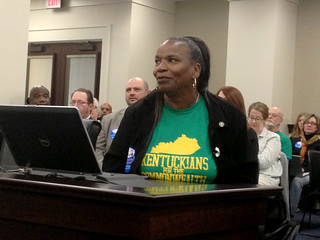Task force hears testimony on voting rights bills
For the first time, some members of the Kentucky Senate got to hear testimony on the issue of restoring voting rights to former felons.
The Interim Task Force on Elections, Constitutional Amendments and Intergovernmental Affairs, with members from both the House and Senate, heard testimony on bills that would allow Kentucky voters to amend the state constitution to automatically restore voting rights to former felons once they’ve served their debt to society.
House Bill 70 has easily passed in the House each of the last several years before dying in the Senate without a vote or even a hearing. This year, Senator Gerald Neal has pre-filed a similar bill in the Senate. If either bill passes in the 2014 General Assembly, the issue will be put on the statewide ballot for Kentucky voters to decide.
“I can contribute to this community, and voting is very important to me,” Tayna Fogle, a KFTC member and former felon, told the task force. “Allow the Kentucky voters to decide whether we should have the right to vote.”
Rev. Dean Bucalos of Louisville works with former felons who are re-entering society, looking for jobs and trying to rebuild their lives.
“In fairness and equity, we need to remove any obstacles that are unnecessary and unfair. … Restoring the right to vote benefits all of us,” Bucalos said.
"I made a mistake. I am not a mistake" - Tayna Fogle
Myrna Perez, an attorney from the Brennan Center for Justice at New York University School of Law, also testified in favor of the bills. The Brennan Center studies the issue of voter disenfranchisement across the country.
Perez explained that only Kentucky, Florida and Iowa permanently deny felons the right to vote. In Kentucky, a felon must receive an individual pardon from the governor through a complicated application process to regain the right to vote. A plurality of states restore voting rights after discharge from prison, parole and probation. Some states allow voting upon release from prison, and a few states have no voting restrictions for felons, even those still in prison.
Visit our Storify page to see our coverage of the comittee hearing on social media.
In Kentucky, some 243,000 people are unable to vote because of a felony conviction. The law affects one in five African-Americans.
Allowing former felons to vote has several benefits, according to Perez:
- It reduces recidivism, or future crimes. Many law enforcement organizations, including the American Probation and Parole Association, Association of Paroling Authorities International, National Black Police Association and American Law Institutes, support restoration of voting rights.
- Children who watch their parents vote are more likely to one day vote themselves and to see that their parents, even if they’ve committed a crime, can still contribute to their communities and their democracy.
- It strengthens our democracy by allowing the people who are living and working in our communities to participate in elections.
No vote was taken. Legislators heard testimony, asked questions and made comments on the issue. The second hour of the hearing was devoted to the issue of requiring voters to present government-issued photo identification before voting.
Recent News
Kentucky’s past legislative session showed alarming trend toward government secrecy
Churchill Downs takes more than it gives. That's why the Kentucky Derby is a no-go for me
‘We must never forget.’ Kentucky town installs markers for lynching victims.
Featured Posts
TJC Rolling Out The Vote Tour – a KFTC Reflection Essay
KFTC Voter Empowerment Contractor Reflection Essay
Voting is Power
Archives
- Home
- |
- Sitemap
- |
- Get Involved
- |
- Privacy Policy
- |
- Press
- |
- About
- |
- Bill Tracker
- |
- Contact
- |
- Links
- |
- RSS




Add new comment